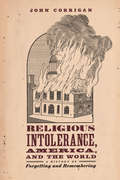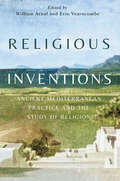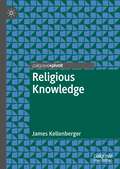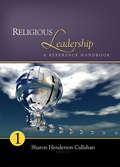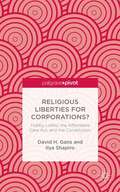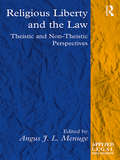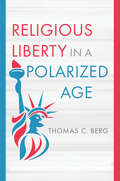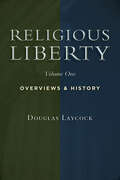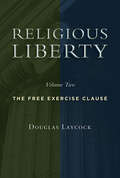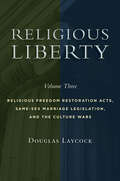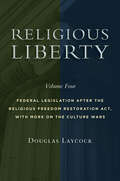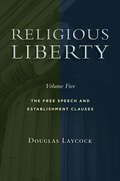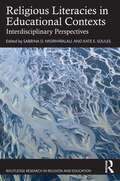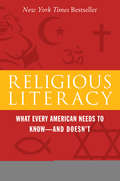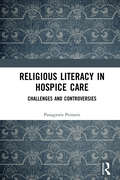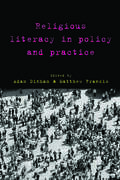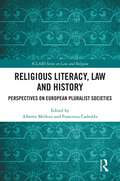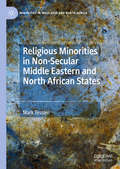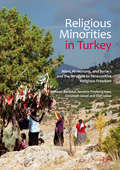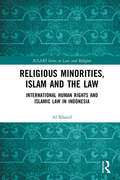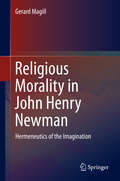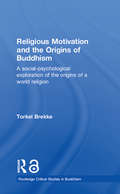- Table View
- List View
Religious Intolerance, America, and the World: A History of Forgetting and Remembering
by John CorriganAs the news shows us every day, contemporary American culture and politics are rife with people who demonize their enemies by projecting their own failings and flaws onto them. But this is no recent development. Rather, as John Corrigan argues here, it’s an expression of a trauma endemic to America’s history, particularly involving our long domestic record of religious conflict and violence. Religious Intolerance, America, and the World spans from Christian colonists’ intolerance of Native Americans and the role of religion in the new republic’s foreign-policy crises to Cold War witch hunts and the persecution complexes that entangle Christians and Muslims today. Corrigan reveals how US churches and institutions have continuously campaigned against intolerance overseas even as they’ve abetted or performed it at home. This selective condemnation of intolerance, he shows, created a legacy of foreign policy interventions promoting religious freedom and human rights that was not reflected within America’s own borders. This timely, captivating book forces America to confront its claims of exceptionalism based on religious liberty—and perhaps begin to break the grotesque cycle of projection and oppression.
Religious Inventions: Ancient Mediterranean Practice and the Study of Religion (Studies in Christianity and Judaism)
by William Arnal, Erin K. VearncombeReligion is a modern invention, a category used to describe and study certain kinds of human behaviour. Yet when it comes to the ancient world and its texts – including those that comprise the Jewish and Christian Bibles – it can be easy to forget that they did not fall from the sky as simple expressions of dogma. Rather, the ancient writings of early Judaism and Christianity are firmly rooted in the world and are the product of an astonishing array of human experience and agency: acts of self-fashioning; of imaginative speculation; of mourning and memorializing; of forming, dissolving, or refashioning group identities; and more.Religious Inventions asks how modern conceptions of religion can shed light on the relics, textual and otherwise, of ancient Mediterranean Jews and Christians. What insights from the contemporary study of religious behaviours and practices challenge what we think we know about the ancient world? Conversely, how can thinking about the ancient world challenge what we think we know about religion today? This volume responds to these questions through explorations of the material and social circumstances behind the production of written artifacts. It examines how religious practices relate to conceptions of identity and critiques the utility of the comparative method for approaching ancient writings.Textual authority is used and abused by many of today’s public figures. Religious Inventions offers an alternative approach to understanding how authority is constructed: from the ground up, by the creative actions and choices of real people who lived long ago.
Religious Knowledge (Palgrave Frontiers in Philosophy of Religion)
by James KellenbergerThis book addresses the place of religious knowledge in religion, particularly within Christianity. The book begins by examining the difference between the general concepts of knowledge and belief, the relation between faith and knowledge, and reasons why belief as faith, and not knowledge, is central to the Abrahamic religions.The book explores the ambivalence about religious knowledge within Christianity. Some religious thinkers explicitly accepted and sought religious knowledge, as did St. Thomas Aquinas, while others, notably Søren Kierkegaard, cast knowledge and seeking it as incompatible with faith. The book also examines two antithetical religious intuitions about knowledge, both at home in the Christian tradition. For one, faith requires a struggle with doubt. For the other, faith requires a certainty that excludes doubt. For the first, religious knowledge would destroy faith. For the second, religious knowledge is compatible with faith and completes it.Though the book focuses on the Christian tradition, it also considers other traditions, including a chapter on the place of religious knowledge in nontheistic religious traditions. The final chapter examines how coming to Wisdom as personified in the Jewish and Christian traditions may be distinct from attaining religious knowledge.
Religious Leadership: A Reference Handbook
by Sharon Henderson CallahanThis 2-volume set within The SAGE Reference Series on Leadership tackles issues relevant to leadership in the realm of religion. It explores such themes as the contexts in which religious leaders move, leadership in communities of faith, leadership as taught in theological education and training, religious leadership impacting social change and social justice, and more. Topics are examined from multiple perspectives, traditions, and faiths.Features & Benefits:By focusing on key topics with 100 brief chapters, we provide students with more depth than typically found in encyclopedia entries but with less jargon or density than the typical journal article or research handbook chapter.Signed chapters are written in language and style that is broadly accessible.Each chapter is followed by a brief bibliography and further readings to guide students to sources for more in-depth exploration in their research journeys.A detailed index, cross-references between chapters, and an online version enhance accessibility for today's student audience.
Religious Liberties for Corporations?: Hobby Lobby, the Affordable Care Act, and the Constitution
by David H. Gans Ilya ShapiroAn expanded version of a series of debates between the authors, this book examines the nature of corporate rights, especially with respect to religious liberty, in the context of the controversial Hobby Lobby case from the Supreme Court's 2013-14 term.
Religious Liberty
by Williams Robinson Daniel N. Richard N.What are the rights of religious institutions? Should those rights extend to for-profit corporations? Houses of worship have claimed they should be free from anti-discrimination laws in hiring and firing ministers and other employees. Faith-based institutions, including hospitals and universities, have sought exemptions from requirements to provide contraception. Now, in a surprising development, large for-profit corporations have succeeded in asserting rights to religious free exercise. The Rise of Corporate Religious Liberty explores this "corporate" turn in law and religion. Drawing on a broad range perspectives, this book examines the idea of "freedom of the church," the rights of for-profit corporations, and the implications of the Supreme Court's landmark decision in Burwell v. Hobby Lobby for debates on anti-discrimination law, same-sex marriage, health care, and religious freedom.
Religious Liberty and the Law: Theistic and Non-Theistic Perspectives (Applied Legal Philosophy)
by Angus J. MenugeQuestions of religious liberty have become flashpoints of controversy in virtually every area of life around the world. Despite the protection of religious liberty at both national and supranational levels, there is an increasing number of conflicts concerning the proper way to recognize it – both in modern secular states and in countries with an established religion or theocratic mode of government. This book provides an analysis of the general concept of religious liberty along with a close study of important cases that can serve as test beds for conflict resolution proposals. It combines the insights of both pure academics and experienced legal practitioners to take a fresh look at the nature, scope and limits of religious liberty. Divided into two parts, the collection presents a blend of legal and philosophical approaches, and draws on cases from a wide range of jurisdictions, including Brazil, India, Australia, the USA, the Netherlands, and Canada. Presenting a broad range of views, this often provocative volume makes for fascinating reading for academics and researchers working in the areas of law and religion, legal philosophy and human rights.
Religious Liberty in a Polarized Age (Emory University Studies in Law and Religion)
by Thomas C. BergHow to heal America&’s deep divisions by preserving religious liberty for all As our political and social landscapes polarize along party lines, religious liberty faces threats from both sides. From antidiscrimination commissions targeting conservative Christians to travel bans punishing Muslims, recent litigation has revealed the selective approach both left and right take when it comes to freedom of religion. But what if religious liberty is part of the cure for our political division? Drawing on constitutional law, history, and sociology, Thomas C. Berg shows us how reaffirming religious freedom cultivates the good of individuals and society. After explaining the features of polarization and the societal benefits of diverse religious practices, Berg offers practical counsel on balancing religious freedom against other essential values. Protecting Americans&’ ability to live according to their beliefs undergirds a healthy, pluralistic society—and this protection must extend to everyone, not just political allies. Lay readers and legal scholars who are weary of partisan quarreling will find Berg&’s case timely and compelling.
Religious Liberty, Vol. 1: Overviews and History (Emory University Studies in Law and Religion)
by Douglas LaycockThe Collected Works on Religious Liberty comprehensively collects the scholarship, advocacy, and explanatory writings of leading scholar and lawyer Douglas Laycock, illuminating every major religious liberty issue from both theoretical and practical perspectives. / This first volume gives the big picture of religious liberty in the United States. It fits a vast range of disparate disputes into a coherent pattern, from public school prayers to private school vouchers to regulation of churches and believers. Laycock clearly and carefully explains what the law is and argues for what the law should be. He also reviews the history of Western religious liberty from the American founding to Protestant-Catholic conflict in the nineteenth century, using this history to cast light on the meaning of our constitutional guarantees. / Collected Works on Religious Liberty is unique in the depth and range of its coverage. Laycock helpfully includes both scholarly articles and key legal documents, and unlike many legal scholars, explains them clearly and succinctly. All the while, he maintains a centrist perspective, presenting all sides — believers and nonbelievers alike — fairly.
Religious Liberty, Volume 2: The Free Exercise Clause (Emory University Studies in Law and Religion)
by Douglas LaycockFor more than thirty years, Douglas Laycock has been studying, defending, and writing about religious liberty. In this second volume of the comprehensive collection of his writings on the subject, he has compiled articles, amicus briefs, and actual court documents relating to regulatory exemptions under the Constitution, the right to church autonomy, and the rights of non-mainstream religions. This collection — which deals with religious schools and colleges, sex abuse cases, the rights of Hare Krishnas and Scientologists, the landmark decision Employment Division v. Smith, and more — will be a valuable reference for churches, schools, and other religious organizations as they exercise their Constitutionally protected freedom of religion.
Religious Liberty, Volume 3: Religious Freedom Restoration Acts, Same-Sex Marriage Legislation, and the Culture Wars (Emory University Studies in Law and Religion)
by Douglas LaycockOne of the most respected and influential scholars of religious liberty in our time, Douglas Laycock has argued many crucial religious-liberty cases in the United States Supreme Court. His noteworthy scholarly and popular writings are being collected in five comprehensive volumes under the title Religious Liberty.This third volume presents a documentary history of efforts to enact and implement state and federal Religious Freedom Resto-ration Acts, to include religious-liberty protections in same-sex marriage legislation, and to protect the rights of both sides in the culture wars. It contains articles in scholarly journals, op-eds for popular audiences, and oral and written arguments.
Religious Liberty, Volume 4: Federal Legislation after the Religious Freedom Restoration Act, with More on the Culture Wars (Emory University Studies in Law and Religion)
by Douglas LaycockOne of the most respected and influential scholars of religious liberty in our time, Douglas Laycock has argued many crucial religious-liberty cases in the United States Supreme Court. His noteworthy scholarly and popular writings are being collected in five comprehensive volumes under the title Religious Liberty.This fourth volume presents a documentary history of the effort to replace the Religious Freedom Restoration Act with the Religious Liberty Protection Act, an effort that failed but led to narrower legislation protecting churches from hostile zoning and protecting the religious rights of prisoners. Documenting culture-war battles over religious liberty and abortion, contraception, and same-sex marriage, this volume includes journal articles, testimony to Congress, shorter popular writings, and letters to such political figures as Congressman Bobby Scott and President Barack Obama.
Religious Liberty, Volume 5: The Free Speech and Establishment Clauses (Emory University Studies in Law and Religion)
by Douglas LaycockOne of the most respected and influential scholars of religious liberty in our time, Douglas Laycock has argued many crucial religious-liberty cases in the United States Supreme Court. His noteworthy scholarly and popular writings are being collected in five comprehensive volumes under the title Religious Liberty.In this final volume Laycock documents the use of the Constitution&’s Free Speech Clause and Establishment Clause in legal briefs, scholarly and popular articles, House testimonies, and written debates. These two clauses have been vitally important in religious-liberty cases concerning religious speech in schools, politics, and the workplace, government funding of religious schools and social services, and the meaning of separation of church and state.
Religious Literacies in Educational Contexts: Interdisciplinary Perspectives (Routledge Research in Religion and Education)
by Sabrina D. MisirHiralall Kate E. SoulesReligious Literacies in Educational Contexts: Interdisciplinary Perspectives provides an overview of current scholarship on religious literacy and its practical applications in public life.As an emerging, interdisciplinary field, religious literacy is vital in understanding how diverse religious beliefs shape social and political landscapes. This volume aims to deepen the conversation among scholars and practitioners by offering actionable recommendations for promoting religious literacy in educational contexts. Key questions addressed include: What does religious literacy mean in different contexts? Why is religious literacy important today? How can educators and scholars foster religious literacy in public settings? This book provides an exploration of these questions as the authors offer an overview of the current scholarship on religious literacy along with its applications in the classroom for both scholars and practitioners.This book is designed for scholars, educators, and practitioners interested in the intersecting fields of religion, education, and public life highlighting the significance of religious literacy in various disciplines and contemporary issues by providing readers with insights and strategies to enhance their understanding and teaching of religious diversity.
Religious Literacy
by Stephen ProtheroThe United States is one of the most religious places on earth, but it is also a nation of shocking religious illiteracy. Only 10 percent of American teenagers can name all five major world religions and 15 percent cannot name any. Nearly two-thirds of Americans believe that the Bible holds the answers to all or most of life's basic questions, yet only half of American adults can name even one of the four gospels and most Americans cannot name the first book of the Bible. Despite this lack of basic knowledge, politicians and pundits continue to root public policy arguments in religious rhetoric whose meanings are missed-or misinterpreted-by the vast majority of Americans. "We have a major civic problem on our hands," says religion scholar Stephen Prothero. He makes the provocative case that to remedy this problem, we should return to teaching religion in the public schools. Alongside "reading, writing, and arithmetic," religion ought to become the "Fourth R" of American education. Many believe that America's descent into religious illiteracy was the doing of activist judges and secularists hell-bent on banishing religion from the public square. Prothero reveals that this is a profound misunderstanding. "In one of the great ironies of American religious history," Prothero writes, "it was the nation's most fervent people of faith who steered us down the road to religious illiteracy. Just how that happened is one of the stories this book has to tell." Prothero avoids the trap of religious relativism by addressing both the core tenets of the world's major religions and the real differences among them. Complete with a dictionary of the key beliefs, characters, and stories of Christianity, Islam, and other religions, Religious Literacy reveals what every American needs to know in order to confront the domestic and foreign challenges facing this country today.
Religious Literacy
by Stephen ProtheroThe United States is one of the most religious places on earth, but it is also a nation of shocking religious illiteracy.Only 10 percent of American teenagers can name all five major world religions and 15 percent cannot name any.Nearly two-thirds of Americans believe that the Bible holds the answers to all or most of life's basic questions, yet only half of American adults can name even one of the four gospels and most Americans cannot name the first book of the Bible.Despite this lack of basic knowledge, politicians and pundits continue to root public policy arguments in religious rhetoric whose meanings are missed--or misinterpreted--by the vast majority of Americans."We have a major civic problem on our hands," says religion scholar Stephen Prothero. He makes the provocative case that to remedy this problem, we should return to teaching religion in the public schools. Alongside "reading, writing, and arithmetic," religion ought to become the "Fourth R" of American education.Many believe that America's descent into religious illiteracy was the doing of activist judges and secularists hell-bent on banishing religion from the public square. Prothero reveals that this is a profound misunderstanding. "In one of the great ironies of American religious history," Prothero writes, "it was the nation's most fervent people of faith who steered us down the road to religious illiteracy. Just how that happened is one of the stories this book has to tell."Prothero avoids the trap of religious relativism by addressing both the core tenets of the world's major religions and the real differences among them. Complete with a dictionary of the key beliefs, characters, and stories of Christianity, Islam, and other religions, Religious Literacy reveals what every American needs to know in order to confront the domestic and foreign challenges facing this country today.
Religious Literacy in Hospice Care: Challenges and Controversies
by Panagiotis PentarisThis is the first book to explore how religion, belief and spirituality are negotiated in hospice care. Specifically, it considers the significant place that spiritual care has in hospice care and claims that the changing role of religion and belief in society highlights the need to re-examine how such identities are integrated in professional practice. Using religious literacy as a framework, the author explores how healthcare professionals in hospice care respond to religion, belief and spiritual identities of service users. Part 1 provides a comprehensive account of the content and history of the place of religion, belief and spirituality in hospice care. Part 2 examines how these topics are negotiated in hospice care by looking at three key areas: environment, professional practice and organisation. Part 3 proposes a religious literacy model applicable to hospice care and explores implications for practice and policy. Lastly, the author identifies future trends in research, policy and practice. Drawing on a range of theories and concepts and proposing a working model that can impact the training of future and current professionals, Religious Literary in Hospice Care should be considered essential reading for students, researchers and practitioners.
Religious Literacy in Policy and Practice
by Edited by Adam Dinham and Matthew FrancisIt has long been assumed that religion is in decline in the West: however it continues to have an important yet contested role in individual lives and in society at large. Furthermore half a century or so in which religion and belief were barely talked about in public has resulted in a pressing lack of religious literacy, leaving many ill-equipped to engage with religion and belief when they encounter them in daily life – in relationships, law, media, the professions, business and politics, among others. This valuable book is the first to bring together theory and policy with analysis and expertise on practices in key areas of the public realm to explore what religious literacy is, why it is needed and what might be done about it. It makes the case for a public realm which is well equipped to engage with the plurality and pervasiveness of religion and belief, whatever the individual’s own stance. It is aimed at academics, policy-makers and practitioners interested in the policy and practice implications of the continuing presence of religion and belief in the public sphere.
Religious Literacy, Law and History: Perspectives on European Pluralist Societies (ICLARS Series on Law and Religion)
by Alberto Melloni Francesca CadedduThe book profiles some of the macro and micro factors that have impact on European religious literacy. It seeks to understand religious illiteracy and its effects on the social and political milieu through the framing of the historical, institutional, religious, social, juridical and educational conditions within which it arises. Divided into four parts, in the first one, One literacy, more literacies?, the book defines the basic concepts underpinning the question of religious illiteracy in Europe. Part II, Understanding illiteracies, debating disciplines?, highlights the theological, philosophical, historical and political roots of the phenomenon, looking at the main nodes that are both the reasons religious illiteracy is widespread and the starting points for literacy strategies. Part III, Building literacy, shaping alphabets, examines the mix of knowledge and competences acquired about religion and from religion at school as well as through the media, with a critical perspective on what could be done both in the schools and for the improvement of journalists’ religious literacy. Part IV, Views and experiences, presents the reader with the opportunity to learn from three different case studies: religious literacy in the media, religious illiteracy and European Islam, and a Jewish approach to religious literacy. Building on existing literature, the volume takes a scientific approach which is enriched by interdisciplinary and transnational perspectives, and deep entrenchment in historical methodology.
Religious Literacy: What Every American Needs to Know and Doesn't
by Stephen ProtheroWe as a people know little about the religions we champion.
Religious Minorities in Non-Secular Middle Eastern and North African States (Minorities in West Asia and North Africa)
by Mark TesslerThis book describes and compares the circumstances and lived experiences of religious minorities in Tunisia, Morocco, and Israel in the 1970s, countries where the identity and mission of the state are strongly and explicitly tied to the religion of the majority. The politics and identity of Jews in Tunisia and Morocco and Arabs in Israel are, therefore, shaped to a substantial degree by their status as religious minorities in non-secular states. This collection, based on in-depth fieldwork carried out during an important moment in the history of each community, and of the region, considers the nature and implications of each group’s response to its circumstances. It focuses on both the community and individual levels of analysis and draws, in part, on original public opinion surveys. It also compares the three communities in order to offer generalizable insights about ways the identity, political culture, and institutional character of a minority group are shaped by the broader political environment in which it resides. The project will appeal to scholars and students in the fields of Middle Eastern and North African studies, Judaic studies, Islamic Studies, minority group politics, and international relations and the Arab-Israeli conflict.
Religious Minorities in Turkey
by Annette Freyberg-Inan Mehmet Bardakci Christoph Giesel Olaf LeisseThis book considers the key issue of Turkey's treatment of minorities in relation to its complex paths of both European integration and domestic and international reorientation. The expectations of Turkey's EU and other international counterparts, as well as important domestic demands, have pushed Turkey to broaden the rights of religious and other minorities. More recently a turn towards autocratic government is rolling back some earlier achievements. This book shows how these broader processes affect the lives of three important religious groups in Turkey: the Alevi as a large Muslim community and the Christian communities of Armenians and Syriacs. Drawing on a wealth of original data and extensive fieldwork, the authors compare and explain improvements, set-backs, and lingering concerns for Turkey's religious minorities and identify important challenges for Turkey's future democratic development and European path. The book will appeal to students and scholars in the fields of minority politics, contemporary Turkish politics, and religion and politics.
Religious Minorities, Islam and the Law: International Human Rights and Islamic Law in Indonesia (ICLARS Series on Law and Religion)
by Al KhanifThis book examines the legal conundrum of reconciling international human rights law in a Muslim majority country and identifies a trajectory for negotiating the protection of religious minorities within Islam. The work explores the history of religious minorities within Islam in Indonesia, which contains the world’s largest Muslim population, as well as the present-day ways by which the government may address issues through reconciling international human rights law and Islamic law. Given the context of multiple sets of religious norms in Indonesia, this is a complicated endeavour. In addition to amending and enacting human rights norms, the government is also negotiating with the long history of Islamisation in Indonesia. Particularly relevant is the practice of customary law, which puts the rights of community over individualism. This practice directly affects the rights of religious minorities within Islam. Readers, especially those conducting research, will also be provided with information and references which are relevant to the field of human rights, especially in relation to religious minorities and international law. The book will be a valuable resource for academics and researchers in the fields of International Human Rights Law, Law and Religion, and Islamic Studies.
Religious Morality in John Henry Newman
by Gerard MagillThis book is a systematic study of religious morality in the works of John Henry Newman (1801-1890). The work considers Newman's widely discussed views on conscience and assent, analyzing his understanding of moral law and its relation to the development of moral doctrine in Church tradition. By integrating Newman's religious epistemology and theological method, the author explores the hermeneutics of the imagination in moral decision-making: the imagination enables us to interpret complex reality in a practical manner, to relate belief with action. The analysis bridges philosophical and religious discourse, discussing three related categories. The first deals with Newman's commitment to truth and holiness whereby he connects the realm of doctrine with the realm of salvation. The second category considers theoretical foundations of religious morality, and the third category explores Newman's hermeneutics of the imagination to clarify his view of moral law, moral conscience, and Church tradition as practical foundations of religious morality. The author explains how secular reason in moral discernment can elicit religious significance. As a result, Church tradition should develop doctrine and foster holiness by being receptive to emerging experiences and cultural change. John Henry Newman was a highly controversial figure and his insightful writings continue to challenge and influence scholarship today. This book is a significant contribution to that scholarship and the analysis and literature comprise a detailed research guide for graduates and scholars.
Religious Motivation and the Origins of Buddhism: A Social-Psychological Exploration of the Origins of a World Religion (Routledge Critical Studies in Buddhism #Vol. 25)
by Torkel BrekkeWhy did people in North India from the 5th century BC choose to leave the world and join the sect of the Buddha? This is the first book to apply the insights of social psychology in order to understand the religious motivation of the people who constituted the early Buddhist community. It also addresses the more general and theoretically controversial question of how world religions come into being, by focusing on the conversion process of the individual believer.
